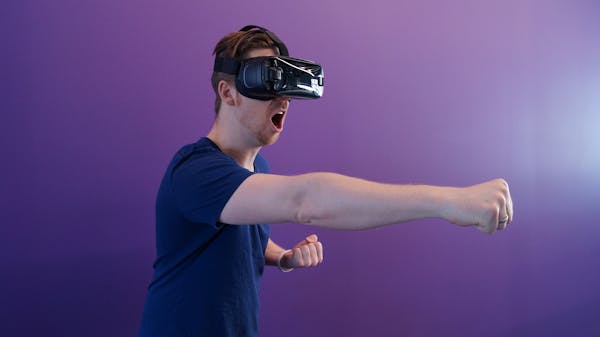
Introduction
Virtual reality (VR) is an immersive computer-generated simulation of a three-dimensional environment that allows users to interact with and explore the environment. It is becoming increasingly popular in the gaming industry, and the potential applications of VR are vast. This article will explore the future of virtual reality and how it will shape the way we interact with technology.Impact on the Gaming Industry
VR has already had a major impact on the gaming industry, with a wide range of games now offering a fully immersive experience. Many companies are investing heavily in the development of VR games, and the number of titles available is increasing exponentially. This is only set to continue as more developers join the fray, and the gaming industry is likely to be transformed by the potential of VR.Impact on Education
VR has the potential to revolutionise the way we learn, providing a more engaging and interactive way to gain knowledge. By using VR, students can explore virtual environments, interact with objects, and learn through experience. This could be especially beneficial for students who struggle to engage with traditional teaching methods, as it provides a more engaging and immersive learning experience.Impact on Building Design
VR can also be used to create virtual models of buildings before they are constructed, allowing designers to experiment with different layouts and materials. This could be especially useful for architects, as it allows them to quickly test different design ideas and make changes before any construction takes place.Impact on Healthcare
VR can be used in healthcare to provide immersive training experiences for medical professionals. This could help reduce the time it takes to train doctors and nurses, as well as improve the quality of care provided. VR can also be used for medical treatments, such as helping patients to overcome phobias or providing rehabilitation for stroke survivors.Impact on Entertainment
VR is also being used in the entertainment industry, with virtual concerts and live events becoming increasingly popular. This provides a new way for fans to experience their favourite artists and get closer to the action than ever before.Conclusion
The future of virtual reality is bright, and the potential applications are vast. It is already having an impact on the gaming industry, as well as education, building design, healthcare, and entertainment. As technology advances, it is likely that VR will continue to shape the way we interact with technology and revolutionise the way we live.References
- Virtual Reality: The Basics. (n.d.). Retrieved from https://www.lifewire.com/virtual-reality-basics-5074545 - Virtual Reality: What it is and how it works. (n.d.). Retrieved from https://www.microsoft.com/en-us/microsoft-365/blog/2016/11/17/virtual-reality-what-it-is-and-how-it-works/ - Virtual Reality | Healthcare Technology | Siemens Healthineers. (n.d.). Retrieved from https://www.healthcare.siemens.com/magnetic-resonance-imaging/virtual-reality - Virtual Reality Concerts – What You Need to Know. (n.d.). Retrieved from https://www.vrs.org.uk/virtual-reality-concerts/* This article was originally published here